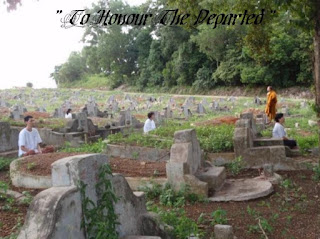"TO HONOUR THE DEPARTED”
~ by Ven Balacitta
Depending on one’s karma, when death occurs, a being can be reborn either into the heavenly realms, as a human, ghost, or animal, or even in the hell states. A being who is reborn as a ghost is sometimes entirely dependant on the offerings of its living relatives for sustenance, unlike humans who can engage in trade or cultivate their own food. It is thus a good practice to offer dana to the departed for unless they are ‘invited’, they cannot enter the humans’ dwelling to partake of the feast. When invited, these beings will then feel very happy for they know that their living relatives still care and think about them (Tirokutta Sutta, Khp 7).
When food dana is offered to the departed, only a being in the ghost realm can enjoy it.
However, all other beings can share in the merits obtained from that act of dana. Apart from food dana, merits can also be obtained and be shared with others when a devotee takes refuge in the Triple Gem, observes the precepts and practises meditation.
Dana
The merits obtained when one offers dana increases in value with the sila of the recipient.
Therefore the merits multiply accordingly depending on whether the dana is offered to an ordinary person, a morally virtuous person, a practising monk, an enlightened noble one, a Buddha, or finally, to the Sangha (Dakkhinavibhanga Sutta, MN 142). Today, not only have you made food offerings to the departed one, but also to the Sangha. When a generous person is reborn, he can have long life, beauty, comfort and strength (Bhojana Sutta, AN 4:59).
Sila
Then again the value of the merits obtained by doing dana is surpassed by that of taking refuge in the Triple Gem, which in turn is surpassed by that of observing the 5 precepts or better still the 8 precepts (Velama Sutta, AN 9:20). Today you have also done both of these things. A person who keeps his precepts well has sila. It is stated in the Mahaparinibbana Sutta (DN 16) that one of good morality can enjoy five benefits, i.e.
1. Through careful attention to his affairs he gains much wealth
2. He gets a good reputation for his good morality
3. He is confident (as he is not bothered by a guilty conscience)
4. He dies unconfused
5. After death, he arises in a good destination.
Bhavana
A person who has sila can then meditate. When he practises metta bhavana, the merits he obtains is much greater than that of doing dana, taking refuge in the Triple Gem, or observing the precepts. His merits increase even more when he develops the wisdom to see the true nature of phenomena through the practice of vipassana meditation (Velama Sutta, AN 9:20).
So you can see that if you really want to share as much merits as you possibly can with your departed relative, you must try to practise dana, sila and bhavana effectively.
Tirokutta Sutta, Khp 7
Dakkhinavibhanga Sutta, MN 142
http://www.suttas.com/mn-142-dakkhinavibhanga-sutta-the-exposition-of-offerings.html
Bhojana Sutta, AN 4:59
https://www.accesstoinsight.org/tipitaka/an/an05/an05.037.than.html
Velama Sutta, AN 9:20
https://www.accesstoinsight.org/tipitaka/an/an09/an09.020.than.html
Mahaparinibbana Sutta (DN 16
https://www.accesstoinsight.org/tipitaka/dn/dn.16.1-6.vaji.html
Sadhu .....…
Sadhu ........
Sadhu ........

No comments:
Post a Comment